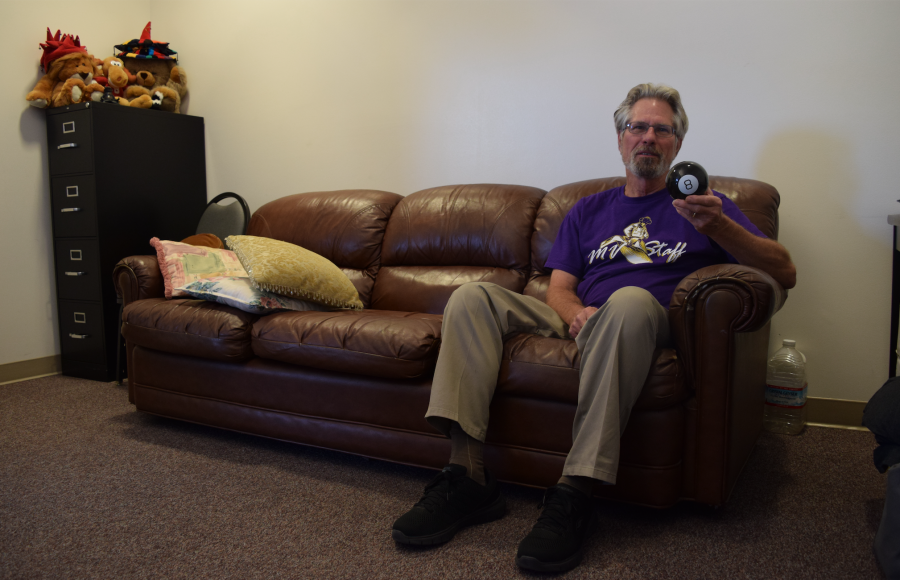His first few years at MVHS were stressful. The toll of working with students who shared their fears and stresses with him resulted in a trip to the emergency room with heart pains and a realization regarding his mental health.
“I think what it was telling me was that I needed to be,” MVHS student advocate Richard Prinz said, “And then I found out it’s not [heart related] that it’s something else, but it still told me ‘ok you need to work on how you’re going to deal with the stress of this job.’ So it took another year, because it happened again the next year, and then it was, ‘ok, I got it, I’m better at [managing] it now’.”
Teachers and administrators, adults that MVHS students encounter around the campus every day, are seen as people who teach, give guidance and organize the school. But they are also people whose work follow them home, stressed about students’ well being. As FUHSD employees, they are mandated to report any abuse or suicidal threats they hear about from students and receive annual training from the district to do so, but beyond the legal, many have a vested interested in helping students — something that follow them
According to history teacher Hilary Barron, students are less eager to talk to teachers about their personal lives. As a former Marquesas coach, Barron shares her perspective as a team advisor.
“Sometimes students come and confide in me,” Barron said. “I’ve had more of that when I was coaching. I think they saw me as a friend, so I had some students talk to me about personal issues and that can be tough.”
Guidance counselor Jessica Coscia notices that when students share emotional experiences with her, she cannot help but bring the feelings home.
“It’s hard. Some days are easier than others,” Coscia said. “Sometimes students come in and they share some very personal things with you and it’s hard to not take that home. We obviously [are] in this profession because we care, and we care about our students and we want to support them. You can’t just leave school and have that feeling leave you.”
For Barron, and other staff at MVHS, she oftens relies on her family at home for support.
“My poor husband gets to hear me vent about all kinds of things,” Barron said. “Sometimes it’s really hard because [I’m] so worried about if whether or not I said the right thing, or if [I] did the right thing to help the students and to be supportive.”
Administrators, like Coscia, have family working in the same area who can relate to her experiences.
“I’m fortunate enough that my husband’s a teacher, so he is in the same field and he understands,” Coscia said. “He has students going through the same thing, so we kind of vent to each other at the end of the day and support each other, [giving] each other tips and ideas.”
As for Barron, she finds another way to relax by having a cutoff time after she leaves campus in an attempt to allow her the space for her own family and emotions.
“I don’t check email at home, like my school email, so I try to distance myself that way,” Barron said. “So I don’t get drawn into confrontations and things. I try as hard as I can to leave that stuff at school.”
Other than receiving family support, school staff also encourage one another by having conversations with each other. The support among staff members expands as Coscia and other counselors consider starting a mental health group for teachers.
“We’re friends, we work closely with everyone so I’ve a good network of staff on campus who will come in and talk to me, and vent about things and I’ll vent to them,” Coscia said. “It’s nice to be able to share your day with people who have gone through the same thing, or who understand what you’re going through.”
Coscia believes that having a large social network is crucial in terms of moral support.
“I think just having a really good social, supportive network that you can talk to, really makes the difference and makes the job a lot easier outside of school,” Coscia said.
As the school’s student advocate, Prinz not only helps students emotionally, but he also listens and motivates parents, teachers and other administrators.
“It’s not limited to students so also parents,” Prinz said, “I talk to parents, and staff and teachers and students. So that could involve interpersonal relationships, relationships with other people or within themselves, stuff going on, conflicts, anxiety, [and] depression.”
“You want to have compassion,” Prinz said. “You don’t want to be separating yourself from people because that’s not empathic. You’re not going to have empathy. So there is a certain amount of sadness you might feel from what people are going through. But you need to hold that in a way that it’s not concrete and all on [your] shoulders. Because it’s very complicated, problems are complicated, and there’s many people involved.”Through longtime experiences and accumulating knowledge, Prinz has learned that not only is listening to people’s personal stories may be difficult to cope with, it is not possible to completely forget about them. In fact, Prinz has organized free parenting classes starting September 27th on Wednesday nights from 5:30 to 7:00 p.m. in the library.










